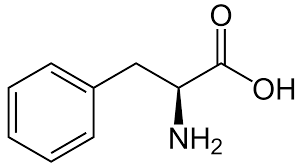L-Phenylalanine

Product Description
L-Phenylalanine is an amino acid with various industrial applications.
Product:
L-Phenylalanine
CAS:
63-91-2
Synonym:
3-Phenyl-L-alanine; (S)-2-Amino-3-phenylpropanoic acid
Structure:

Typical Characteristics
Appearance
White to off-white powder or crystals
Density
1.29 g/cm3
Melting point
283 °C (decomp)
Molecular Weight
165.19
Odor
Odorless
Purity
≥98%
Refractive index
1.576
Uses, Applications & Markets
Key applications
get a quote
We Offer L-Phenylalanine
in various grades
A few of the grades available are listed below:



L-Phenylalanine used in many
industry applications
L-Phenylalanine is an amino acid with various industrial applications. Here are some of its industrial uses:
- Pharmaceuticals: L-Phenylalanine is used as a precursor in the synthesis of various pharmaceuticals, including analgesics, antidepressants, and antihypertensive drugs. It serves as a building block for the production of active pharmaceutical ingredients (APIs) and therapeutic compounds.
- Food and Beverage Industry: It is utilized as a flavoring agent and sweetener in the food and beverage industry, particularly in the production of artificial sweeteners such as aspartame. L-Phenylalanine imparts a sweet taste and is often used in low-calorie and sugar-free products.
- Cosmetics: L-Phenylalanine is used in the cosmetics industry in skincare formulations for its potential skin-lightening and anti-aging properties. It may be included in creams, serums, and lotions targeting hyperpigmentation and skin discoloration.
- Nutritional Supplements: It is used as a dietary supplement in the form of L-phenylalanine capsules or tablets. L-Phenylalanine supplements are often marketed for their potential benefits in mood enhancement, cognitive function, and weight management.
- Animal Feed Additive: L-Phenylalanine is sometimes included in animal feed formulations as a nutritional supplement for livestock and poultry. It may help improve animal growth, feed efficiency, and overall health.
- Biotechnology: L-Phenylalanine is used in biotechnological applications, including microbial fermentation processes for the production of amino acids, enzymes, and other bioproducts. It serves as a substrate for microbial strains engineered for metabolic engineering and biocatalysis.
- Chemical Synthesis: It serves as a starting material or intermediate in organic synthesis reactions, particularly in the production of fine chemicals, agrochemicals, and specialty chemicals. L-Phenylalanine derivatives may be used in the synthesis of dyes, polymers, and pharmaceutical intermediates.
- Research and Development: L-Phenylalanine is utilized in laboratory research and development for various biochemical and biophysical studies. It may be used as a substrate for enzyme assays, protein purification, and cell culture experiments.
- Flavors and Fragrances: L-Phenylalanine derivatives are used in the production of flavors and fragrances, where they contribute to the aroma profile of food products, perfumes, and personal care items.
- Diagnostic Reagents: L-Phenylalanine may be used in the formulation of diagnostic reagents and biochemical assays for the detection of phenylketonuria (PKU) and other metabolic disorders. It serves as a substrate for enzymatic assays and colorimetric tests.
- Industrial Enzymes: L-Phenylalanine derivatives may be used as substrates or inhibitors in enzyme assays and screening assays for the identification and characterization of industrial enzymes. They play a role in enzyme kinetics studies and enzyme engineering applications.